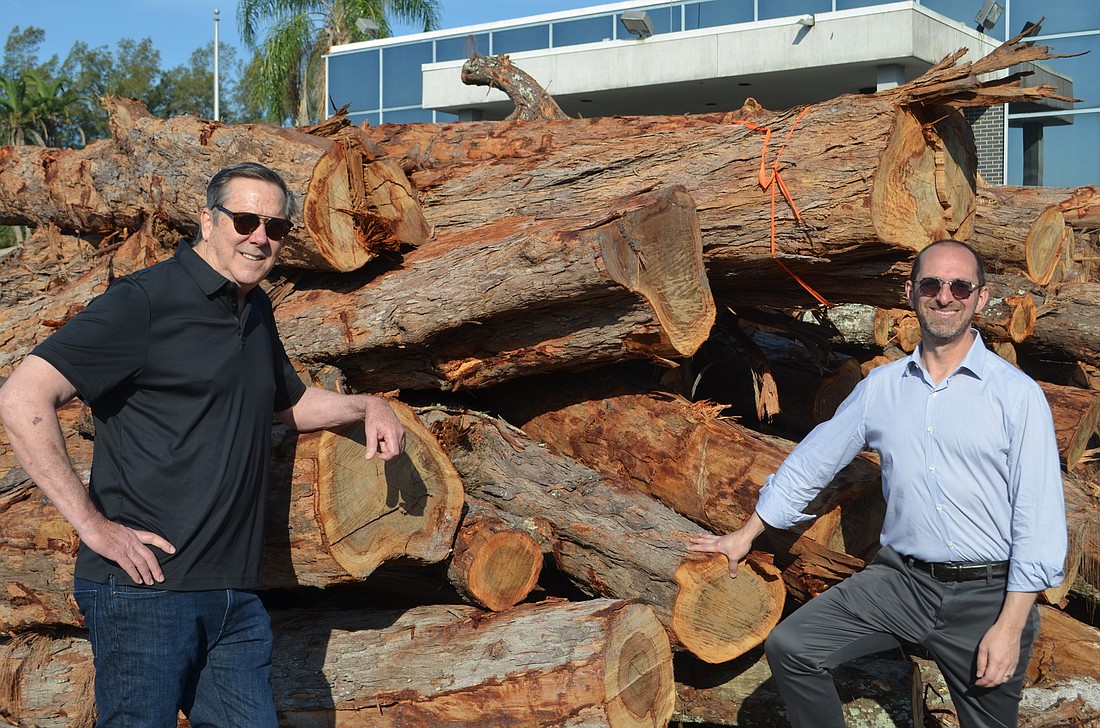- January 29, 2025
-
-
Loading

Loading

There’s a pile of logs on the north end of a plot of land destined to become a parking lot for Mar Vista Dockside employees and patrons, but it’s not headed to a garden in the form of shredded mulch.
Nope, the stack of Australian pines taken down with dozens of other invasive trees will be converted into handmade furniture by Dale Rieke of Wood Street Studios over the next year or more.
Benches, tables, possibly strips of wood veneer are planned using a raw material most builders and land-clearing operations just convert into tiny chips suitable for landscaping.
“Longboat Key has declared war on Australian pines, and we’re suiting up,’’ said Ed Chiles, president of The Chiles Group, which not only owns the plot of land at Palm Drive and Cedar Street but also Mar Vista Dockside nearby along with Sandbar Seafood & Spirits on Anna Maria and The Beach House in Bradenton Beach. “It shows how you can take a problem and make it into an opportunity.’’
Chiles and business partner and architect Barron Schimberg are working together on this project with Rieke as a means of reclaiming something that otherwise would be disposed of.
Australian pines were brought to Florida originally for their towering height, as a means of breaking up wind to prevent property damage. But their promise didn’t live up to expectations. Without a firm root system in Florida’s soft soil, they often toppled instead of holding up against the wind. The trees also expand rapidly and force out other species. Today, local governments frequently cut them down to be rid of them, as the city of Sarasota recently did along the Ringling Causeway. Longboat Key offers property owners cash assistance to have them removed, particularly along major rights of way.
The hardness of their trunks, though, makes them ideal for the project the three men envisioned.
“They’re called ‘ironwood’’ in Africa,’’ Chiles said.
The pile of logs will be milled by Rieke on site to various dimensions, then left to dry in the sun for months. After that, the wood will be kiln-dried before he will create a series of design prototypes and production models. It’s difficult to estimate the cost of finished products, Schimberg said. A typical bench, though, might cost between $1,000 to $1,500.
The idea for the furniture project began not long after the town rolled out a schedule of rebates for property owners to eliminate similar trees on their property, and the Chiles Group began installing similar Australian pine benches at Mar Vista.
It was about that time when Chiles said the idea for the parking lot/office space arose. Knowing the land was full of Australian pines, the idea to work with Rieke was born.
“He’s really studied this stuff,’’ Schimberg said of Rieke. “30 years of knowledge. He’s forgotten more about it that we will ever know.’’
Most saws can’t get through the wood., but Schimberg said the plan is to use as much of the wood as possible. Handled correctly, even the rounded edges sawn from the logs to make square timbers can be made into something.
“I love the story they tell,’’ Chiles said of the fallen logs. “Let’s take what’s a problem and create something that will be here long after I’m gone.’’